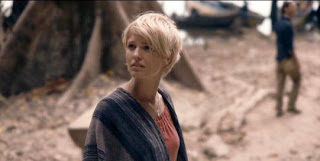It's remarkable how certain films manage to still look so magnificent when provided with such shockingly miniscule funding. In Monsters, filmmaker Gareth Edwards is working with a budget of only $15,000, the same as camcorder-filmed haunted house horror Paranormal Activity, an amount that would make Hollywood soil its gold-plated underwear in awe of how Edwards achieved something so visually striking with the limited finances. The cinematography is no doubt magnanimous, the director spending the minimal cash appropriately to sketch a convincing large scale setting; the film is a pleasure to look at.
It's true, the art department most definitely deserves recognition for the momentous feat, yet Monsters - for a number of reasons - isn't all that it should be. The director has stated that he wanted to make "the world's most realistic monster movie", but in doing so, he's crafted a creature feature that is frequently a dull experience, occasionally bordering upon a tiresome terrain that lacks in an immersing storyline.

What should have been a thrilling adventure about two terrified individuals trekking through a dangerous jungle under the constant fear that giant aliens are about to crush them to death has turned into a character drama revolving around a hapless guy and gal wandering through a deserted area which just so happens to have unseen extraterrestrials positioned somewhere nearby. Even with this route it still could have worked, but the execution is drab at best.
Monsters takes place six years after a NASA space probe containing samples of alien life accidentally crash-landed when entering Earth‘s atmosphere, resulting in obscure creatures popping up all over Mexico. These octopus-like beasts caused a large section of the country to be quarantined in an area entitled, "The Infected Zone," where people are strongly suggested not to venture. In the present day, the threat of aliens are part of everyday life, with the government consistently bombing sites to try and prevent their spreading.

Our two main characters are photojournalist Andrew Kaulder (Scoot McNairy), who’s looking for his big break by photographing alien-induced destruction, and unnerved tourist Samantha Wynden (Whitney Able), the daughter of Andrew's boss. Samantha has been injured following an attack on one of the monsters, and Andrew has been ordered by her father to safely escort her back home to America within 48 hours.
A not-so-thrilled Andrew accepts the offer and starts on a journey with Samantha, intending to accompany her to a ferry that will take her home. However, things get complicated when their passports are stolen, and they are forced to take a different trail, namely through the infection zone where the tentacled monsters roam.

I would love to tell you that Monsters is a fun, tense and scary sci-fi thriller that successfully redefines the alien invasion genre, but this is annoyingly not the case. The relationship between the two easy-going leads is the movie's main driving force, with the titular space inhabitants not making much of an appearance, fading away into the background. While this restraint is clearly deliberate, it nonetheless left me wanting a whole lot more than what I was given.
The grip of the film's octopus tentacles isn't tight enough to keep us on the hook, our attention more drawn to the ticking of our watches than the action on-screen. It should be intriguing, yet something drags it away from this opportunity. The weak script doesn't offer a helping hand either, with some messy, uninspired dialogue that McNairy and Able try their best to liven up.

Our two leads are almost Monsters' saving grace, their characters sharing a reasonable bond that at times manages to keep us from dozing off. With a subtle romantic element that, although predictable, seems realistic enough to not appear corny or formulaic, the two mix well together and make for watchable heroes. They're both kind, good-spirited and seemingly without a single bad bone in their bodies, aiding in how they connect with each other.
Edwards does show a flamboyant amount of directing talent here, filming each scene with hand-held cameras, rendering the film with an almost documentarian feel similar to last year's District 9. He has surrounded it with an enticing mood and an atmosphere of unease that nearly makes up for the troubling absence of tension, beautifully capturing the setting with luxurious allure.

While the special effects may not be up to Hollywoods' spectacular standards, they are mighty impressive for a film of this budget. Mostly covered up by low lighting, the creatures look splendidly hideous yet beautiful, towering over the petrified people below and whining whale-like moans. They are, more often than not, decently animated, save for the climax where the CGI is a little too obvious; it's a shame they're so underused.
Ultimately, Monsters is quite the disappointment. While the direction and visuals are astonishing for a film with such low funding, it's still dull and unengaging, moving along at a schizophrenic, uneven pace. It's ambitious and well-meaning with a not-so-inconspicuous commentary on immigration, but in the end it just falls flat. I'm sorry, Edwards, but if you make a movie called Monsters, you'd better make sure they're not just background extras.
5/10





































